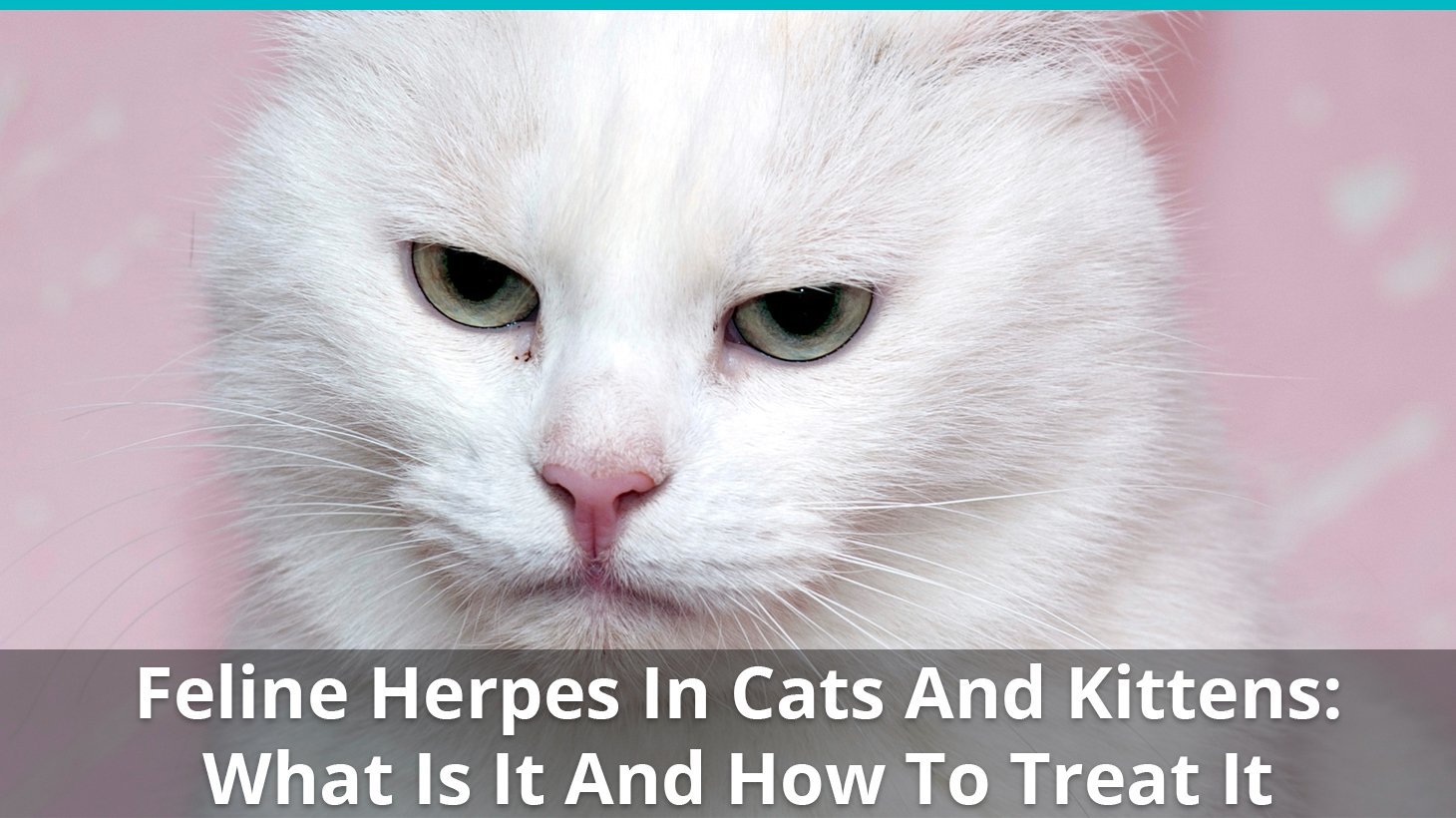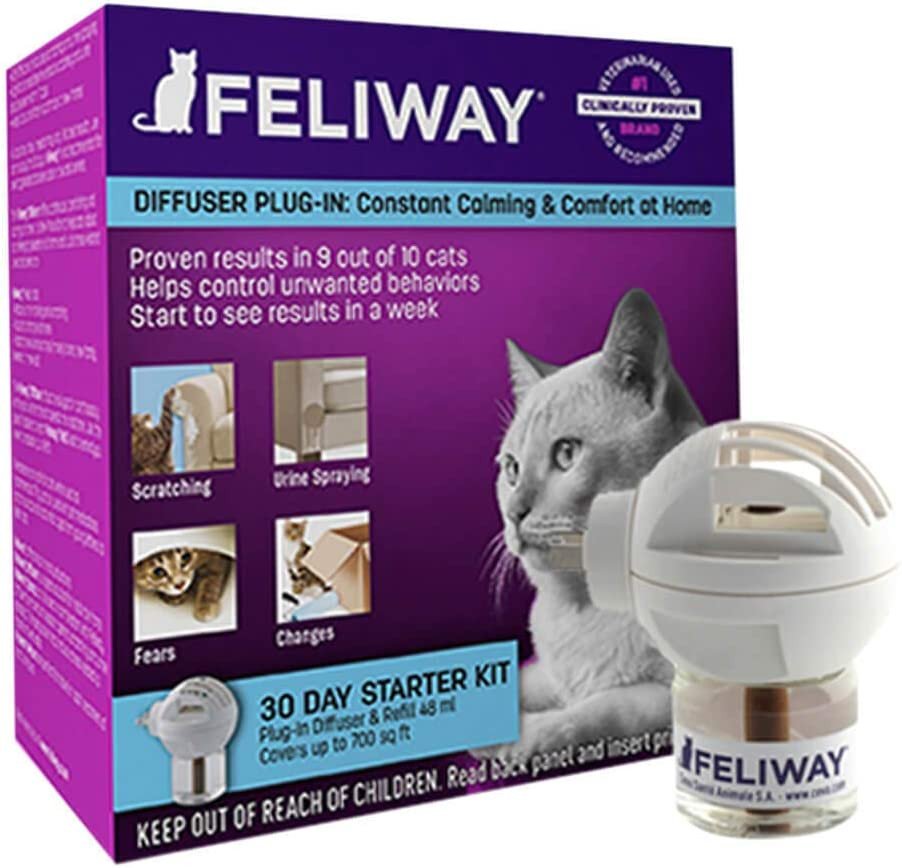Catological is reader-supported. If you buy through the links on our site, we may earn a commission.
If you have come to this page, you likely suspect your cat has feline Herpes, or that your cat has been diagnosed with this infection.
It may sound like a scary diagnosis, but the reality is, you can do a lot to help your cat recover from acute Herpesvirus infection, and this article has all the advice you need to care for your cat and limit future episodes.
What is Feline Herpes?
Feline Herpes is caused by a virus called Feline Herpesvirus (FHV). This virus is the most common cause of upper respiratory infections in cats, and most cats have contracted this infection some time in their lives.
Feline Herpes is not contagious to humans and is definitely not a sexually transmitted disease!
Herpes causes respiratory and eye symptoms, so it is often referred to as “Cat Flu” or even “Feline Viral Rhinotracheitis” (FVR).
While it is very contagious among cats, it cannot be passed to humans or dogs.
Of course, we would still recommend you follow good hygiene practices, including washing your hands after handling sick cats in case the infection is complicated by other bacterial infections that might affect people.
Symptoms of Feline Herpes Infection
Here is a quick overview of feline herpesvirus symptoms, which we’ll cover more in-depth below:
- Inflammation of the upper respiratory tract
- Puffy red eyelids
- Water or sticky eye discharge
- Nasal congestion
- Sneezing clear or cloudy discharge
- Harsh breathing
- Excessive drool
Infection with this virus causes inflammation of the upper respiratory tract – eyes, nose, throat and windpipe.
This inflammation leads to red puffy eyelids with a watery or sticky discharge (conjunctivitis), and also nasal congestion, and sneezing clear or cloudy discharge.
This combination of symptoms makes the cat feel feverish and miserable, often leading to a poor appetite and lethargy. The blocked, congested nose makes the cat’s breathing sound harsh, and the cat may drool excessively, especially if it has to breathe through its mouth.
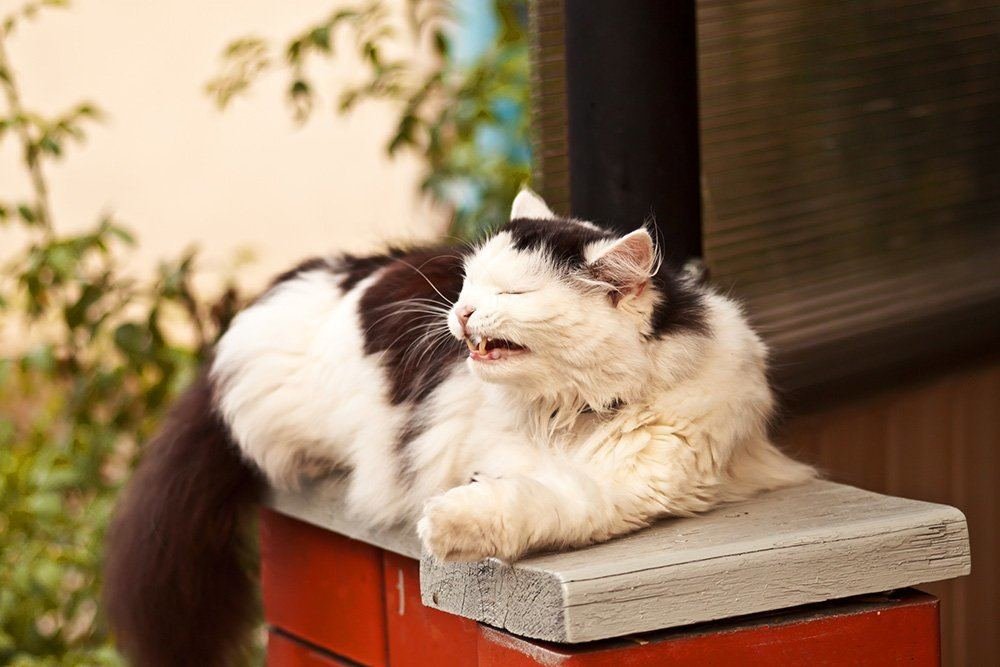
The symptoms can be worse in cats that are stressed, have poor nutrition, suffer from other chronic illnesses, or are taking medication such as steroids.
The infection can be particularly severe in young kittens with immature immune systems, or kittens infected with the virus before they were born
In some cases, the virus also causes inflammation of the cornea (eyeball surface), leading to eye inflammation (keratitis) and ulceration – a painful condition that makes the cat squint, and the eye discharge is even more pronounced.
Eye ulceration can be so severe that it sometimes requires surgical intervention, and the worst-case scenario results in loss of vision or even loss of an eye.
Another complication of infection may include loss of tear production (dry eye) and rolled-in eyelids that cause the eyelashes to rub on the eyeball (entropion).
All of these signs are typical of herpes virus infection, but they may also be caused by Calicivirus and Chlamydia or other inflammatory eye conditions such as allergies.
Skin inflammation (Dermatitis) is a rare complication of feline Herpes infection.
How Do Cats Get Herpes?
Herpes virus is highly contagious and is spread from cat to cat via direct contact when grooming, or via aerosol particles that spread as a cat sneezes, or by contacting items that have moist eye or nose discharge on them, such as food bowls, grooming equipment or bedding.
The virus particles can stay infectious for several hours until the discharge they are in has dried out.
The infection is often picked up from another household cat or in a communal housing situation such as a shelter, boarding cattery, or breeding facility.
When a cat becomes infected, they do not show any clinical signs for several days but can still spread the virus to other cats. The symptoms can last up to three weeks, and the sick cat is contagious to other cats for the whole time.
The infection may also be acquired at birth, especially if the mother is a carrier and the pregnancy’s stress allows the virus to spread to her kittens.
Latency
Herpesvirus behaves a bit like cold sores in humans.
Most cats infected with Herpes never clear the virus from their system, instead, the virus survives in an inactive form inside the cat’s body (within nerve cells).
In many cats, this causes no further problems. However, the virus can become reactivated during periods of stress or illness.
The symptoms may be mild at this stage, and may even be confused with seasonal allergies, however, the cat is still highly contagious to other cats.
This is why Herpes infection is so common in boarding catteries and shelters, as the stress of moving into a communal environment results in viral reactivation.
Some medications and even pregnancy can also be enough to trigger virus reactivation.
Are Any Types of Cat More Prone to Herpes?
Any cat can become infected with Herpes.
However, some cats are more likely to struggle with the severity of infection, including:
- Young kittens,
- Cats with weak immune systems because of stress or other conditions,
- Flat-faced breeds such as the Persian may struggle with nasal congestion because of their short noses, and eye problems in these breeds may be more severe because of their eye shape and size.
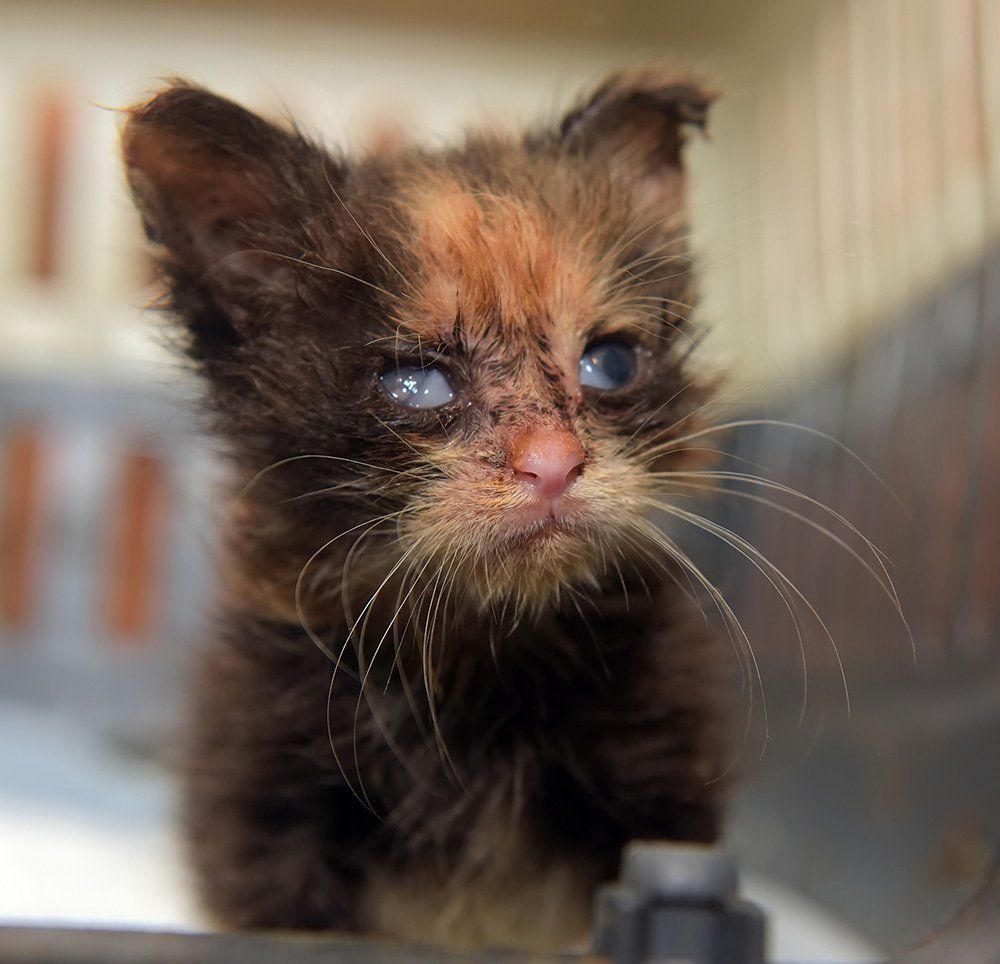
Diagnosis of FHV Infection
It is important to get any cat with sneezing, eye problems, or inappetence to be checked by a veterinarian.
The mild forms of Herpes infection may only require supportive care at home, much like if you have a cold, but it is essential to check if your cat needs treatment for some of the more severe complications associated with Herpesvirus.
Your vet may make a presumptive diagnosis of Herpes given the combination of history and clinical signs (conjunctivitis, nasal discharge, sneezing), especially if there are signs of cornea involvement, such as squinting or a blue or cloudy eye.
However, they may also recommend diagnostic tests to help confirm the diagnosis, especially if they think Chlamydia infection is also possible.
Diagnostic Tests for Feline Herpes
Your vet may do a swab from your cat’s eyes or throat, looking for virus DNA with a PCR test or for virus isolation or culture, which will help identify what your cat has been infected with. This helps your vet choose the best course of treatment for your furry friend.
Fluorescein dye may also be applied to the eyes, looking for any evidence of eye ulceration.
If a virus is in its latent phase, diagnostic tests may be unrewarding.
Treatment of FHV
If your cat is sick, it is essential they are seen by a vet straight away so any severe complications can be identified and treated.
A complete cure for Herpes infection is not feasible because the virus hides away from the immune system after infection.
The potential for relapses might sound like bad news, but cats with Herpes virus can be successfully treated and managed so they can go on to lead happy healthy lives.
There are two types of treatment used for Herpes infection.
First, there are antiviral drugs that slow down the virus’ ability to multiply.
Second, supportive care for secondary infections, dehydration, and other complications of Herpes infection.
Antibiotics will not treat viruses (just like a human cold), so your vet will not prescribe antibiotics unless they are concerned about eye ulceration, secondary bacterial infections, or if the cat is severely ill.
Antiviral drugs
Some treatments inhibit the virus, but they do not kill it.
These treatments include topical eye drops such as iodine, idoxuridine, and cidofovir.
These are often used if there is eye ulceration, and your vet can advise if these treatments should be prescribed for your cat.
There are also oral antiviral drugs such as Famciclovir, which may be recommended by your vet if your cat has frequent relapses of symptoms. Famciclovir is bitter tasting, so this type of medication may need to be given in a nice-tasting pill pocket.
L-Lysine is a natural amino acid. Supplementation with lysine may help some cats that have recurrent herpes relapses by suppressing viral replication (it slows the virus from multiplying, so fewer virus particles are shed).
Lysine comes in capsules, pastes tablets, and powders. It is best given with food as it can upset some cats’ stomachs. Ask your vet for advice about how much to give. Lysine is better for long-term use to minimise relapses; it is not likely to be helpful as a sole treatment for acute infections.
Other treatments for Herpes infection
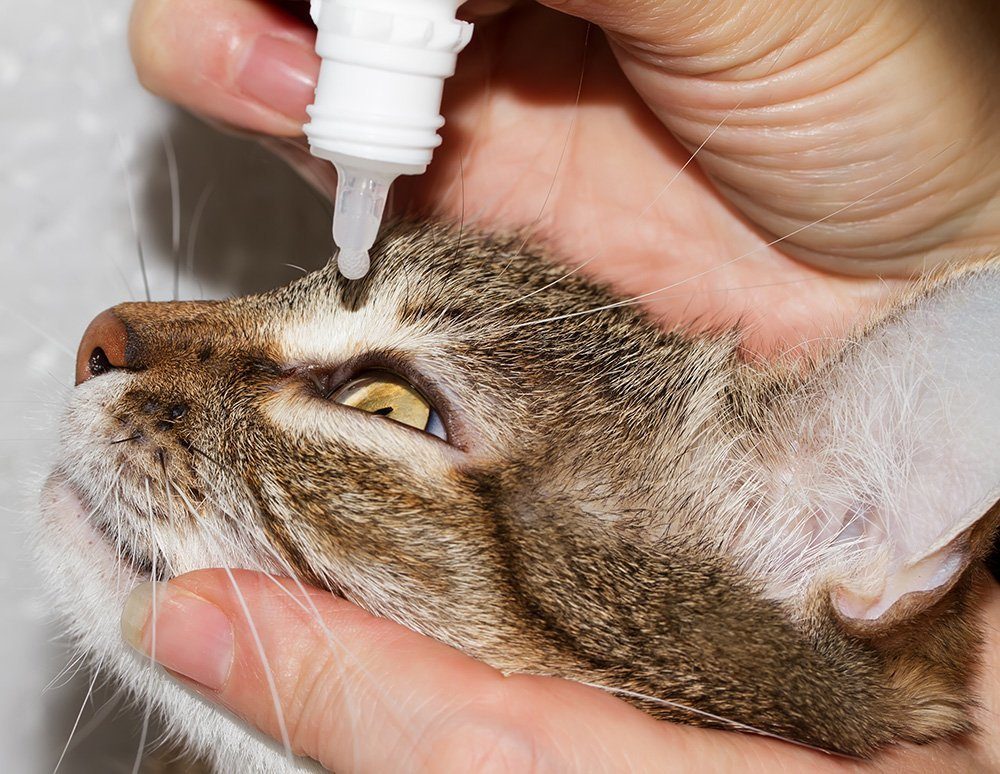
Eyedrops are often prescribed to lubricate the eye, suppress viral replication and treat secondary infections. It is very important you follow your veterinarians’ instructions on how often to apply these drops, it can be as often as every few hours!
Many cats need anti-inflammatory medication to clear the congestion and reduce the pain and inflammation. You will need to follow your vet’s instructions carefully when using these medications.
Oral antibiotics may also be prescribed in tablet, liquid or injection form.
Home Care
Here is some of the most important advice for treating a cat with an upper respiratory infection such as Herpes.
Caring for your cat, following your veterinarian’s instructions, and nursing it through infection can mean the difference between successful treatment and disaster.
Cats HATE being dirty. They do not groom themselves when they have a blocked nose and feel miserable.
Use a soft brush to groom your cat and a damp cloth to keep their face clean. You may need to use warm saline to gently bathe their eyes and nose to soak and then remove the crusty discharge; then, your cat can see better and smell their food.
If a cat has a blocked nose, their sense of smell is poor, and they won’t want to eat.
Use moist canned food with an attractive smell, such as tuna, and is easy to eat. Carefully warm the food so it smells delicious – but make sure it is not so hot that it burns their mouth! You may need to stroke your cat while it eats or hand-feed it.
It is also essential to make sure your cat drinks enough when it is feeling unwell, otherwise, the congestion will get worse, and dehydration is potentially fatal.
Ensure there are clean water bowls or a fountain near your sick cat. Feeding moist food will help with moisture consumption, as will offering low-salt chicken broth or milk if your cat will tolerate it.
Putting your cat in the bathroom while you shower will allow the steam to clear the nasal congestion. Note – in the bathroom, NOT the actual shower!
Make sure litter boxes are kept clean and that your sick kitty has plenty of fresh air, natural light, and rest. Keep other pets and children away from the patient as much as possible.
Your veterinarian might recommend a stay in the hospital to administer fluid therapy if your cat is dehydrated, provide nutritional support via tube or syringe, and use appetite stimulants to improve appetite.
Treating Corneal Disease
Inflammation of the eye surface, and especially corneal ulceration, needs to be treated aggressively to prevent permanent damage and scarring to the eye.
Eye drops to suppress the virus multiplication and treat secondary infections are often used, as described in the treatment section on Antiviral drugs.
Your vet may recommend surgery to remove affected eye tissue and stimulate natural healing. A graft of healthy cornea tissue may also be needed. This is often done by a specialist veterinary ophthalmologist. Discuss with your vet if a referral to an eye specialist is right for your cat.
Prevention of Cat Herpes
Prevention of Herpes virus disease has two aspects. One part is preventing new infections in a cat that has never had the infection before. The other aspect is trying to prevent or minimize viral reactivation (relapses) in a cat that has had a Herpes infection in the past.
Preventing New Herpes Infections
Vaccination of cats against the Herpes virus is the most important way of preventing new infections. The core vaccinations your vet will recommend stimulating immunity against feline Herpes, as well as other diseases.
Just like the human influenza vaccine, vaccinating your cat will not protect against infection altogether, but it will help to reduce the severity of the symptoms in most cats. Adult cats that have been vaccinated before exposure to the virus tend only to have mild self-limiting symptoms.
The World Small Animal Veterinary Association recommends kittens have their first vaccination at 6 to 8 weeks of age and repeat vaccination boosters every 2—4 weeks until the kitten is at least 16 weeks of age.
It is vital that you prevent your cat or kitten from contacting cats that may be shedding the virus, especially for young kittens that have not had their entire course of kitten vaccinations. Cats that are in a high-risk environment, such as regular visits to a boarding facility, may require more frequent vaccinations than other cats.
If you introduce a new cat into a household, they should be quarantined away from other cats for at least two weeks. The new cat should also be vet checked before introducing it to its new home.
Hard objects such as cages and food bowls can be disinfected using 1-part bleach to 32 parts water, applied to surfaces that have been thoroughly cleaned and dried first. Leave it on for 10 minutes. Wash hands and clean under nails, then use a hand sanitizer. The bedding should be put through a hot soapy wash and hung in the sunshine or put through a drier.
Preventing Relapses
Herpes’s latent or carrier state cannot be cured. Instead, the aim is to reduce the frequency and severity of relapses.
Your vet may recommend more frequent nasal administered vaccines to stimulate local immunity, thereby minimizing relapses and recurrent shedding in chronic or recurrent carrier cats. Vaccination with the core vaccines is usually still recommended, as it provides immunity to other infections. Check with your veterinarian about what is best for your cat.
Prevent viral relapses by avoiding stressful situations such as changes in routine or boarding in a cattery. Consider using a family member, friend, or house sitter to care for your cat if you are going away on holiday.
Lysine supplementation helps prevent relapses in many cats (see above).
Make sure the environment is clean with plenty of fresh air and natural light, and make sure kitty is eating a healthy balanced diet.
A Feliway diffuser like the one below may help reduce stress, and diets containing natural stress relief ingredients, such as Hills CD Multicare or Royal Canin Calm, might also be recommended by your veterinarian.
If you have any questions or concerns, you should always visit or call your veterinarian — they are your best resource to ensure the health and well-being of your pets.
Sources:

